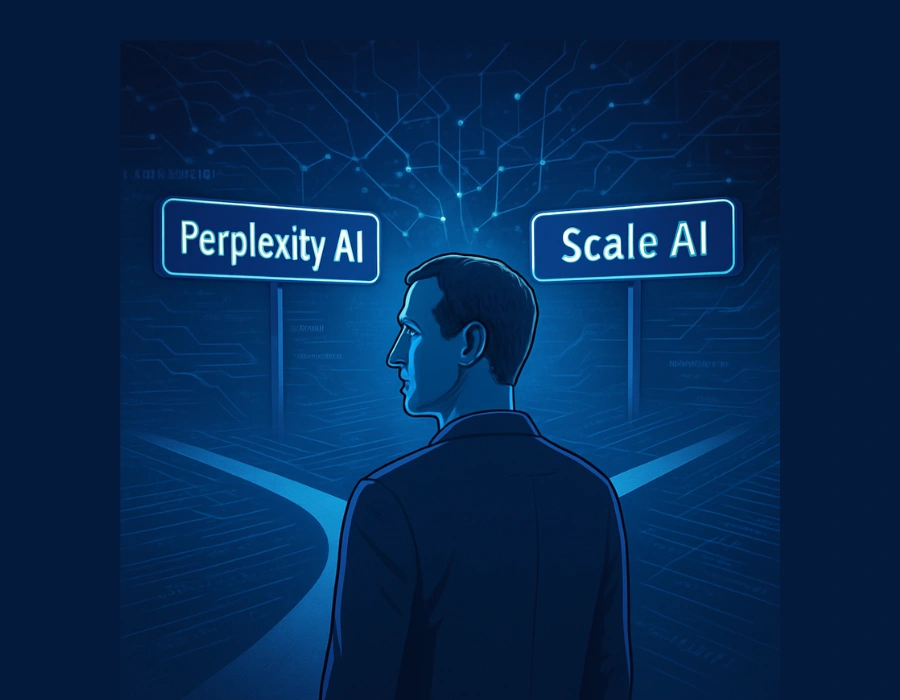Meta Platforms Inc. held acquisition talks with Perplexity AI, a fast-growing generative AI startup, before ultimately finalizing a $14.3 billion investment in Scale AI, according to sources familiar with the matter.
The discussions, which haven’t been publicly disclosed until now, highlight the urgency with which Meta CEO Mark Zuckerberg is trying to position the company at the forefront of the AI arms race. Although Meta and Perplexity were unable to reach a deal, the conversations indicate that Meta was seriously exploring strategic acquisitions before opting for a major stake in Scale AI.
Founded in 2022, Perplexity AI has quickly risen to prominence by offering a generative AI-powered alternative to traditional search engines. The platform provides summarized answers, complete with citations and query refinement options, directly challenging Alphabet’s Google. Its user-friendly interface and commitment to transparency have earned it strong traction in the competitive AI search space. Most recently, Perplexity closed a funding round that brought its valuation to approximately $14 billion.
Meta’s interest in Perplexity didn’t stop at a potential acquisition. Sources say the company also attempted to recruit Perplexity CEO Aravind Srinivas to lead part of its internal “superintelligence” team. This unit, launched by Meta to build advanced AI systems, represents Zuckerberg’s strategic shift toward aggressively building in-house capabilities, powered by elite talent.
While Srinivas reportedly declined Meta’s offer, the attempt underscores the company’s intensified focus on hiring the best minds in artificial intelligence. According to multiple industry insiders, Meta is offering eye-popping compensation packages to lure top researchers. Some at OpenAI have been offered $100 million in signing bonuses, but many have still declined, according to comments made by OpenAI CEO Sam Altman on a recent podcast.
In the wake of the failed Perplexity deal, Meta announced a massive $14.3 billion investment in Scale AI, a leading data-labeling company critical to training machine learning models. The investment gives Meta a 49% stake in Scale AI and marks one of the social media giant’s most significant moves in the AI space to date.
Meta’s AI expansion strategy is becoming clearer: it is blending large-scale investments, high-profile talent acquisition, and partnerships to rapidly accelerate its AI roadmap. The company has already brought on Alexandr Wang, Scale AI’s former CEO, and is in talks with other prominent AI figures like former GitHub CEO Nat Friedman and Daniel Gross, the CEO of Safe Superintelligence—a new lab co-founded by ex-OpenAI chief scientist Ilya Sutskever.
Meta is also reportedly exploring infrastructure partnerships with emerging labs. One such discussion involves providing data center resources to Safe Superintelligence, signaling that Meta may eventually offer computing support similar to what Amazon and Google provide AI startups through their cloud platforms. While Meta has not yet positioned itself as a cloud provider, such moves would mark a notable shift in strategy.
Other Big Tech players like Google and Amazon have taken the lead in supplying chips and compute infrastructure to the broader AI startup ecosystem. Meta’s approach appears to be different—focusing more on acquisitions, internal teams, and selectively supporting emerging research labs through tailored deals.
The company’s recent moves show a growing sense of urgency within Meta. Despite having significant internal AI resources, including its Llama open-source language models, Meta has lagged behind companies like OpenAI, Google DeepMind, and Anthropic in public perception and technological leadership.
Zuckerberg seems intent on closing that gap. His recent AI pivot includes consolidating efforts under a single “superintelligence” team and openly competing for talent in what many are calling a new AI talent war.
Industry analysts suggest that Meta’s strategy reflects a calculated attempt to centralize the most critical aspects of AI development—core models, expert teams, and the infrastructure that powers them. According to Dr. Rajiv Shenoy, an AI strategist at Stanford University, “Zuckerberg is betting big on centralizing elite talent and building from the top down. This could either be a bold leap forward or a costly gamble.”
The failed acquisition attempt of Perplexity, followed by the investment in Scale AI, also shows how Meta is leaving no stone unturned in its race to reclaim AI relevance. And while some experts argue that generative AI remains in its early innings, the size of these investments signals that competition is already fierce—and becoming more high-stakes by the day.
With AI reshaping everything from search to social media, Meta’s latest moves confirm that it sees this moment as a make-or-break inflection point. Whether it can close the innovation gap and regain a leadership position remains to be seen. But one thing is clear: Meta is willing to spend, hire, and partner at scale to get there.
